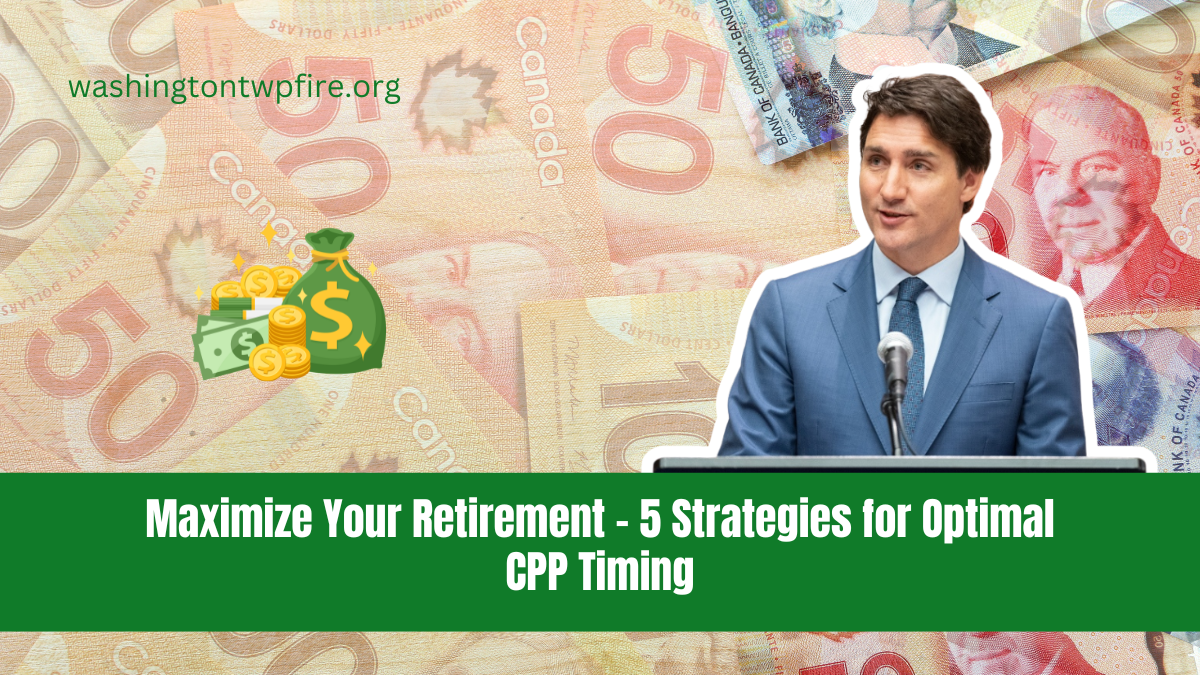Planning for retirement involves making critical decisions that can significantly impact your financial well-being. One such decision is determining the optimal time to start receiving your Canada Pension Plan (CPP) benefits. The timing of your CPP can influence the amount you receive monthly and, consequently, your overall retirement income. This article explores five strategies to help you decide when to begin your CPP benefits to maximize your retirement income.
Understanding CPP Timing
The standard age to start receiving CPP benefits is 65. However, you have the flexibility to begin as early as age 60 or delay until age 70. Starting earlier results in reduced monthly payments, while delaying increases them. Specifically:
- Early Start (Age 60-64): Your monthly payment decreases by 0.6% for each month you receive it before age 65, totaling a 7.2% reduction per year.
- Delayed Start (Age 66-70): Your monthly payment increases by 0.7% for each month you delay after age 65, totaling an 8.4% increase per year.
Factors Influencing CPP Timing
Several personal factors should influence your decision on when to start CPP benefits:
- Life Expectancy: If you anticipate a longer lifespan, delaying CPP can result in higher lifetime benefits. Conversely, if you have health concerns or a shorter life expectancy, starting earlier might be advantageous.
- Financial Needs: Assess your current financial situation. If you require immediate income to cover expenses, starting CPP earlier could be beneficial. If you have other income sources, delaying might be preferable.
- Employment Status: If you plan to continue working past age 60, delaying CPP can prevent your benefits from being taxed at a higher rate due to employment income.
Break-Even Analysis
A break-even analysis helps determine the age at which the total amount received from delaying CPP equals the amount you would have received by starting earlier. For example:
- Starting at 60 vs. 65: The break-even point is approximately age 74. If you live beyond this age, delaying until 65 results in higher lifetime benefits.
- Starting at 65 vs. 70: The break-even point is around age 82. Living beyond this age means delaying until 70 yields greater lifetime benefits.
Impact of Inflation and Investment Returns
Consider the effects of inflation and potential investment returns:
- Inflation: CPP benefits are indexed to inflation, maintaining their purchasing power over time.
- Investment Returns: If you start CPP early and invest the payments, the returns could offset the reduction in benefits. However, this depends on achieving a return rate higher than the reduction percentage.
Tax Considerations
CPP benefits are taxable income. Starting CPP while you have other significant income sources could place you in a higher tax bracket, reducing the net benefit. Delaying CPP until your income decreases in retirement might result in a lower tax rate on your benefits.
| Strategy | Description | Pros | Cons | Considerations |
|---|---|---|---|---|
| Start at Age 60 | Begin receiving reduced benefits early | Immediate income | Lower monthly payments | Suitable if immediate funds are needed |
| Start at Age 65 | Begin receiving standard benefits | Standard monthly payments | None | Balanced approach |
| Delay to Age 70 | Delay benefits for increased payments | Higher monthly payments | Requires financial stability until then | Beneficial for longer life expectancy |
| Invest Early Payments | Start early and invest payments for growth | Potential for investment returns | Investment risk | Depends on market performance |
Deciding when to start your CPP benefits is a personal choice that depends on various factors, including life expectancy, financial needs, employment status, and tax considerations. By carefully evaluating these factors and possibly consulting with a financial advisor, you can make an informed decision that aligns with your retirement goals and maximizes your income during retirement.
FAQs
What is the maximum CPP benefit I can receive?
The maximum monthly CPP benefit for new beneficiaries starting at age 65 is $1,203.75 as of 2021. This amount is adjusted annually for inflation.
Can I work while receiving CPP benefits?
Yes, you can work while receiving CPP benefits. If you are under 70, you and your employer must continue to make CPP contributions, which will increase your benefits through the Post-Retirement Benefit.
How do I apply for CPP benefits?
You can apply for CPP benefits online through your My Service Canada Account or by completing a paper application available on the Service Canada website. It’s recommended to apply six months before you want your benefits to start.
Are CPP benefits adjusted for inflation?
Yes, CPP benefits are indexed to the Consumer Price Index and are adjusted annually to reflect changes in the cost of living.
Can I change my CPP start date after applying?
If you wish to change your CPP start date after applying, you must request the change in writing before your benefit payments begin. Once payments have started, the start date cannot be changed.







